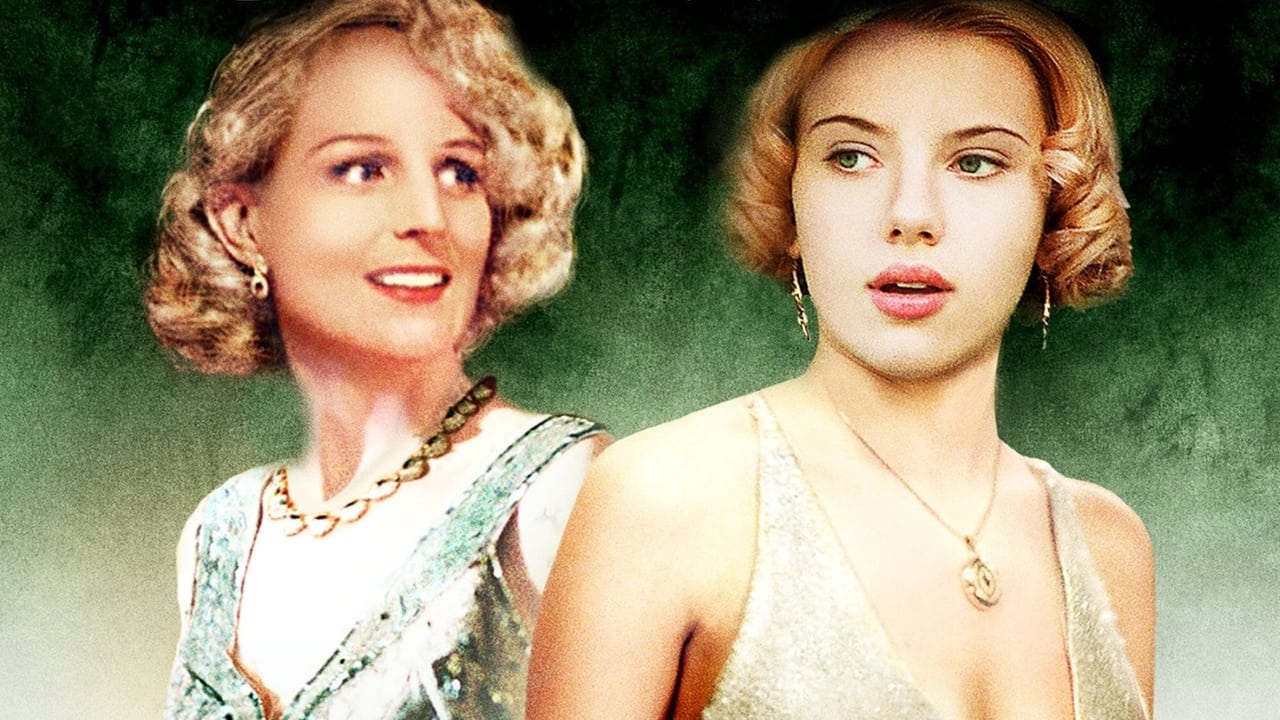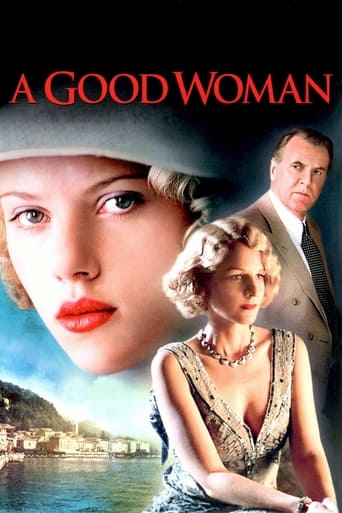



One of my all time favorites.
While it doesn't offer any answers, it both thrills and makes you think.
View MoreI think this is a new genre that they're all sort of working their way through it and haven't got all the kinks worked out yet but it's a genre that works for me.
View MoreIt's a movie as timely as it is provocative and amazingly, for much of its running time, it is weirdly funny.
View MoreHow this gem escaped our wonderful viewing pleasure after being trapped in nightly TV land for years is incredible! Always a fan of Helen Hunt in everything she's done and who would not adore Scarlet J? Put them both in incredible gowns and parade them through the rich portions of the world would be enough.But the plot, acting and surprises, then recalling special moments of vacation days past in those settings ... oohlala, wish we were there!12 stars!Be prepared to be entertained throughout every minute of this colorful story.
View MoreReview: This movie seemed like it was made for TV. It's one of those period dramas, set in the 1930's, about troubled relationships and cheating husbands. I liked the twist in the movie, which kept it slightly interesting, but the core of the storyline was a bit weak. The cast wasn't that bad but there wasn't anyone to bring some wit or intense drama to the film. Don't get me wrong, I am quite a fan of Tom Wilkinson, who has seemed to matured with age, but the main characters Helen Hunt and Scarlett Johansson, didn't really make the movie enjoyable, due to the script. Personally, I was expecting better from the cast, but I think that the whole project failed because of the poor direction. Disappointing!Round-Up: Everybody knows that Scarlett Johansson is blowing up at the moment in the Avengers franchise so she just can't seem to do wrong. Helen Hunt has been out of the limelight for some time now which is most probably due to her short range. She's quite good with drama concepts, but she hasn't really done anything else, except for Twister which was years ago. Tom Wilkinson has put in some great performances in movies like Michael Clayton and Batman Begins and he made me laugh as the baddie in RocknRolla. As for this movie, I enjoyed the banter between the old guys, but that was about it. Budget: N/A Worldwide Gross: $7millionI recommend this movie to people who are into there period drama/romantic stories about a lady who has an affair with a married man. 3/10
View MoreLady Meg Windemere (Scarlett Johannsen) is a beautiful, young newlywed, residing presently on Italy's Amalfi coast with her rich, gorgeous husband. She believes everything in her life is perfect, for she is rather innocent about the way the world generally turns. One day, there is a new lady in town, very lovely Mrs. Erlynne (Helen Hunt), who is a notorious woman. It is rumored that she goes from man to man, extracting money and gifts through a sort of romantic blackmail. Meeting Lord W in a glamorous shop, she advises the young hubby to get a beautiful fan for his wife's pending birthday. Before much grass grows, Mrs E starts to conduct a secret liason with Lord Windemere. Gossip flies furiously but never reaches Meg. However, another gentleman in their circle, Lord Darlington, tries to woo Meg away from her husband, too. Unbelievably, another Brit, Tappy (Tom Wilkinson), who has been married and divorced twice, casts his eyes on Mrs. E. With such a tangled web of deceit, woven by the principal parties, what will be the result? And, are there even more secrets to tumble out? It was probably to be expected that in the modern age, producers would feel that a film entitled Lady Windemere's Fan wouldn't make it so they settled on A Good Woman. There was likely not much difference at the box office, which is darn shame, for this is an elegant, witty film. Of course, since most of the dialogue belongs to Wilde, what else can you expect? From classic lines like "a devilish woman is a bother, a good woman is a bore" to "plain women cry, beautiful women go shopping", Wilde had a great knack for truthful human observation. All of the actors are wonderful, with Hunt doing great work as the scarlet woman one can't really hate and Wilkinson putting forth his usual terrific stuff. Johannsen, too, is beautiful and touching as the naive wife while all of the other cast members are very fine as well. Once again, too, the Italian scenery makes for a gorgeous setting while the 30's costumes and amenities look fabulous as well. The script adaptation and direction are secure and fluid as well. In short, if you like such films as A Room with a View or An Ideal Husband (also Wilde), try to get your hands on this one, also. You will find it most rewarding in every way. Oh, and pass it along to your family and friends, for it deserves a wider audience than the usual suspects.
View MoreThis is the third screen version of Oscar Wilde's "Lady Windermere's Fan"; earlier versions, neither of which I have seen, were made by Ernst Lubitsch and Otto Preminger. "A Good Woman", a phrase which occurs a number of times in the script, was Wilde's original title for his play. He was persuaded to change it, but the filmmakers have revived it, probably because the plot of the film is significantly different from that of the play.The greatest difference is that the film is not set in the London of 1892 but in Amalfi in 1930. (Strangely for a film set in thirties Italy there is no mention of Mussolini or Fascism). The main characters are all wealthy Britons or Americans on holiday. Lord and Lady Windermere become Robert and Meg Windermere, a pair of American newlyweds on their honeymoon. (In the play Lord and Lady Windermere had been married for about two years and had a young son; Lord Windermere's Christian name was Arthur).Meg wrongly believes that Robert is having an affair with Stella Erlynne, an ageing New York society beauty notorious for her scandalous affairs, especially with married men. Her faith in her husband shattered, she resolves to leave him for Lord Darlington, a wealthy British playboy visiting Amalfi on his yacht. Mrs Erlynne, fearing that Meg is about to take a step which will ruin her life and reputation, takes a dramatic step to prevent this and to bring about a reconciliation between Meg and Robert.The point of relocating the action from the drawing-rooms of London to the Amalfi coast was presumably to provide some spectacular scenery to make the film more visually attractive, and the point of making some of the characters American was presumably to provide roles for Hollywood names like Helen Hunt and Scarlett Johansson. The point of updating the action from the 1890s to the 1930s escapes me.Transplanting the action of an Oscar Wilde play, whether in place or in time, is in any case an operation fraught with risk. Wilde is sometimes regarded as a primarily comic playwright, but of the four so-called "drawing-room comedies" on which his reputation as a dramatist primarily rests only "The Importance of Being Earnest" is a pure comedy. The others, including "Lady Windermere's Fan", although they contain a good deal of witty dialogue, are essentially dramas on a serious theme, combining satire with social comment. The prime target of Wilde's satire is the hypocrisy of the British upper classes among whom his plays are set, especially their double standards about sexual matters. They are prepared to turn a blind eye to adultery provided that it remains discreet, but can be mercilessly unforgiving, especially to erring wives, when it results in public scandal or in pregnancy outside marriage. Many of Wilde's characters, including Mrs Erlynne, are hiding a guilty secret. His interest in this topic was doubtless due to the fact that he was himself obliged to keep his sexuality secret and that, as a gay man, he belonged to a class even more despised by society than unmarried mothers or unfaithful wives.One problem with this film is that, by the 1930s, British society was rather more tolerant towards divorce than it had been in the 1890s, and American society more tolerant still. (There were a number of Hollywood films about divorce during the period, although the British cinema generally steered clear of the topic). The filmmakers do seem to have been aware of this problem, as they make a few changes to the plot to compensate, but unfortunately these changes upset the subtle balance of Wilde's play.Wilde's Mrs Erlynne was a woman who made one mistake in her youth and spent the rest of her life paying for it. As such a person would not have been shunned in 1930s New York in the same way as she would have been in 1890s London, the scriptwriters here make her a woman who has led a notoriously promiscuous life, but Helen Hunt's Stella Erlynne comes across as so cold, selfish and vicious that even her redeeming act of self-sacrifice towards the end is not enough for the audience to accept her as the "good woman" of the title. Wilde's Lord Darlington, despite his faults, was at least genuinely in love with Lady Windermere. Here he is an obvious cad with no feelings for anyone except himself, but the result of this change is to make us wonder why Meg, or any woman in her right mind, could ever have contemplated eloping with such a bounder.The scriptwriters obviously felt that "Lady Windermere's Fan" does not contain enough Wildean bons mots, because they try to remedy the deficiency by importing some of his more famous epigrams from other plays, not realising that, outside their original context, these witticisms either lose their meaning or become liable to misinterpretation. The line, for instance, about America being the only country to have gone from barbarism to decadence without an intervening period of civilisation does not reflect Wilde's personal view but rather the prejudices of a bitter, cynical character in "A Woman of No Importance", the play from which it is taken.The best acting contributions come from Tom Wilkinson as Mrs Erlynne's lover Lord Augustus and Stephen Campbell Moore as Darlington, the only actors who seem at home with Wilde's style. Most of the others make little impression. Johansson, who can be so good in the right role, as she was in "Girl with a Pearl Earring", makes an insipid, milk-and-water Meg.My overall impression was that the filmmakers were trying to make a "heritage cinema" style drama, along the lines of "A Month by the Lake", another film about Anglo-American holidaymakers in thirties Italy. Unfortunately, although this style may be well suited to the works of H.E. Bates, it seems quite wrong for Oscar Wilde. 5/10
View More